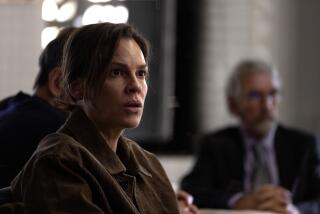Critic’s Notebook: Golden Globes 2015: ‘Boyhood,’ ‘Grand Budapest’ directors walk alone
- Share via
The Golden Globe Awards’ five nominations for “Boyhood” and four for “The Grand Budapest Hotel” will be analyzed many ways in a season that has seen little clarity beyond the emerging dominance of “Birdman.” I call it the Texas Effect. Or to put it in modern terms, #TheTexasEffect.
Both “Boyhood” director Richard Linklater and “Grand Budapest’s” Wes Anderson were raised in Texas during the 1960s with the contrarian ethos of a state peopled by stubbornly independent souls. Now, with Thursday’s Globe nominations, Wednesday’s nominations from the Screen Actors Guild Awards and nods from critics groups nationwide, their very independent, Texas-bred filmmaking styles have brought some focus to the movie madness of this year’s awards season.
If nothing else, Texas was a starting point for these singular filmmakers with their radically distinct cinematic styles and penchant for producing extremely personal films. Although their definitions of “personal” and “filmmaking” are poles apart, their success suggests mainstream, bigger and broader isn’t better. Smaller and specific is.
GOLDEN GLOBES 2015: Top nominees | List | Snubs/Surprises | Reactions | Announcement | Full coverage
Houston, a highly industrialized oil town with a chip on its shoulder — resenting Austin its hipness, Dallas
its polish, Fort Worth its cowboys — was the birthplace for both directors and where they spent at least some of their boyhood. An angry, edgy, ungainly metropolis, it breeds a deeper strain of self-reliance than most.
That a couple of the industry’s most creative renegades come from the same spot on the map is not an accident. Everything about their careers reflects the kind of singularity that Texas likes to claim. It is, after all, called the “Lone” Star State.
This attention from the Globes is a first for both. They are up against each other in the screenplay category, which, by the way, is where Oscar has tended to put them in the past. They could, however, both win a best picture Globe since Anderson’s nomination is in the comedy/musical category, Linklater’s in drama.
Their starring actors have been generating heat from all critical corners — Ralph Fiennes for making sure “Grand Budapest” patrons are well taken care of, Ethan Hawke and Patricia Arquette for their parenting skills in “Boyhood.”
And while clarity in the awards season is a passing thing, clarity in movie-making is a defining quality — one that Linklater and Anderson not only claim but cling to.
There is an artistic certainty that you feel in every frame of “Budapest” and “Boyhood.” The plotting is precise, the voice is clear, there is no confusion. Consider the complex machinations of a grand old European hotel in a time of radical change seen through the prism of Anderson with his incredible eye for pomp and ceremony. Lean into the intricate emotional landscape of a boy growing up and Linklater’s gift for distilling experience and emotion into its purest form.
Uncompromising, guided by an inner voice, bringing their unique sensibilities to whatever they touch — it’s an entrenched pattern. If you don’t know their work, make the time, for like actors, Linklater and Anderson leave everything on the screen. They’ve done so from the beginning.
Linklater’s first feature film in 1988 was “It’s Impossible to Learn the Plow by Reading Books.” A meandering rumination on a young man’s mundane experience, it wasn’t all it could be, but the seeds for greatness were visible. Conversations have become Linklater’s métier. “Before Sunrise,” “Before Sunset” and “Before Midnight” parsed romance and the relationship between two people. “Boyhood” expands the idea in scope and time. Shot over 12 years, it takes apart adolescence and a family.
“Bottle Rocket” in 1996 put Anderson on the map. Starring Owen and Luke Wilson — dare I mention their Texas roots too? — and co-written with Owen, it was a ludicrous teenage heist gone wrong. But it spotlighted Anderson’s ability to see the world in a different way, to be fascinated by the more eccentric sides of humanity, all of which is so incredibly realized in “Budapest.”
It’s not that either have gone unnoticed by Hollywood. Linklater even took on a classic kid comedy in “Bad News Bears,” to disappointing effect. But they’ve never gotten that invite to become a member of the in-crowd, perhaps because the insiders knew they’d likely reject the offer.
Neither are joiners. Anderson and Linklater, in nearly every creative sense, walk alone, electing to choose the path not taken.
That solitary, individualized dedication to their own artistic gods have created uneven and unusual bodies of work. Their triumphs — like “Budapest” and “Boyhood” — are indelible. Their detours intriguing — the amazing animation of Anderson’s “Fantastic Mr. Fox” or the endearing mortician who was so killer in Linklater’s “Bernie.”
Even their failures are interesting. But that is not what we’re celebrating at the moment. For now they are riding the crest of this year’s awards season, captivating critics, crowds and a growing number of their peers.
“The Grand Budapest Hotel” and “Boyhood” speak eloquently of the power of creativity and individuality to move us. Anderson. Linklater. Each making their mark in no uncertain terms, on their own terms. It’s gratifying.
And it’s a reminder: Never underestimate the Texas effect.
Twitter: @betsysharkey
More to Read
Only good movies
Get the Indie Focus newsletter, Mark Olsen's weekly guide to the world of cinema.
You may occasionally receive promotional content from the Los Angeles Times.









